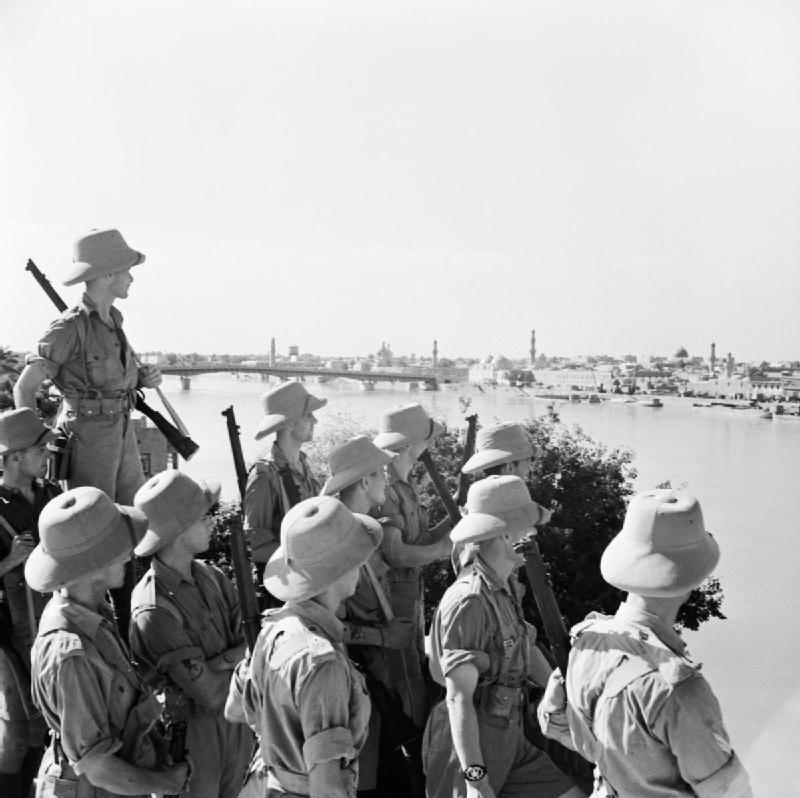
Anglo-Iraqi War
The Anglo-Iraqi War was a British-led Allied military campaign during the Second World War against the Kingdom of Iraq under Rashid Gaylani, who had seized power in the 1941 Iraqi coup d'état with assistance from Germany and Italy. The campaign resulted in the downfall of Gaylani's government, the re-occupation of Iraq by the British, and the return to power of the Regent of Iraq, Prince 'Abd al-Ilah, a British ally.
For the conflict from 2003 until 2011, see Iraq War.
Mandatory Iraq had been governed by the British since 1921. Prior to Iraq's nominal independence in 1932, Britain concluded the Anglo-Iraqi Treaty of 1930, which was opposed by Iraqi nationalists, including Rashid Ali al-Gaylani. Although Iraq was considered a neutral power under Regent Abd al-Ilah, it had a pro-British government. In April 1941, Iraqi nationalists organized the Golden Square coup, with assistance from Nazi Germany and Fascist Italy. The coup ousted Abd al-Ilah and installed al-Gaylani as Prime Minister. He officially established cordial relations with the Axis powers, prompting the Allies to respond. For the Allies, Iraq represented an important land bridge between British forces in Egypt and India.
Following a series of skirmishes, Allied airstrikes were launched against Iraq on 2 May. The campaign resulted in the collapse of al-Gaylani's short-lived government, and re-installed Abd al-Ilah as the Regent. This increased the influence of the Allies in the Middle Eastern theatre.
Campaign[edit]
2 May[edit]
Most combat operations of the Anglo-Iraqi War centred on the Habbaniya area. Starting early on 2 May, British airstrikes were launched against the Iraqis from RAF Habbaniya.[11] While the largest number of British troops were ultimately assembled in the Basra area, an advance from Basra was not immediately practicable and did not get under way until after Rashid Ali's government was already collapsing. Initially, the Iraqi siege of RAF Habbaniya and the ability of the besieged British force there to withstand the siege was the primary focus of the conflict. Air Vice-Marshal Smart's decision to strike at the Iraqi positions with air power not only allowed his force to withstand the siege, but to neutralise much of Iraq's air power. While the relief force from Palestine arrived in Habbaniya after the siege was over, it did allow an immediate change over to the offensive.
Siege of Habbaniya[edit]
Air Vice-Marshal Smart's tactics to defend Habbaniya was to mount continuous bombing and strafing attacks with as many aircraft as possible.[79] At 05:00 on 2 May 33 aircraft from Habbaniya,[11] out of the 56 operational aircraft based there,[80] and eight Wellington bombers from Shaibah began their attack.[11] A few of the Greek pilots being trained at Habbaniya also joined in the RAF attack.[3] Within minutes the Iraqis on the escarpment replied by shelling the base, damaging some planes on the ground. The Royal Iraqi Air Force (RIrAF) also joined in the fray over Habbaniya.[11] RAF attacks were also made against Iraqi air fields near Baghdad, which destroyed 22 aircraft on the ground;[79] further attacks were made against the railway and Iraqi positions near Shaibah, with the loss of two planes.[11] Throughout the day, the pilots from Habbaniya flew 193 sorties[11] and claimed direct hits on Iraqi transports, armoured cars and artillery pieces;[81] however five aircraft had been destroyed and several others put out of service. On the base 13 people were killed and 29 wounded, including nine civilians.[11]
By the end of the day, the Iraqi force outside Habbaniya had grown to roughly a brigade.[82]
Battle honours[edit]
The British and Commonwealth system of battle honours recognised participation in the Anglo-Iraq War by the award to 16 units of the battle honour Iraq 1941, for service in Iraq between 2–31 May 1941. The award was accompanied by honours for three actions during the war: Defence of Habbaniya awarded to one unit for operations against the Iraqi rebels between 2–6 May, Falluja awarded to two units for operations against the Iraqi rebels between 19–22 May, and Baghdad 1941 awarded to two units for operations against the Iraqi rebels between 28–31 May.[162]